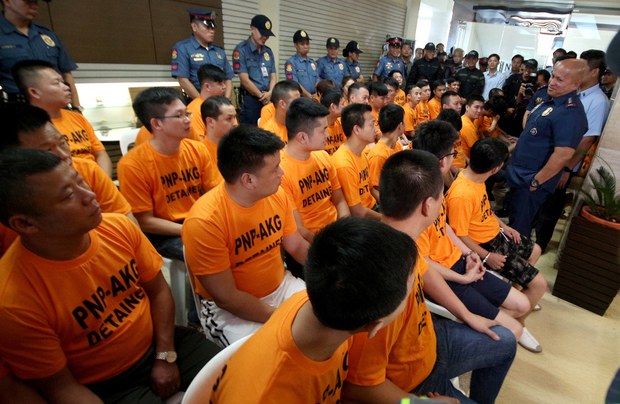Philippine Cops Arrest 43 Suspects, Rescue Woman in Casino Kidnapping Case
2017.07.20
Manila
 Philippine National Police chief Ronald Dela Rosa (right) stands in front of Chinese and Malaysian suspects (in orange shirts) arrested in a kidnapping case, at police headquarters in Manila, July 20, 2017.
Philippine National Police chief Ronald Dela Rosa (right) stands in front of Chinese and Malaysian suspects (in orange shirts) arrested in a kidnapping case, at police headquarters in Manila, July 20, 2017.
Philippine police said Thursday they had rescued a Singaporean woman abducted by a kidnap-for-ransom gang preying on casino gamblers, and arrested 43 foreign suspects in the Manila area, including two Malaysians.
Kidnap victim Wu Yan, 48, was approached by the two Malaysian men while at the baccarat table at Solaire Resorts and Casino in Pasay City on Monday, according to police. The two men, identified by authorities as Ng Yu Men and Go Kok Keong, befriended the victim and invited her to go to another casino, officials said.
However, the suspects took Wu to a hideout in another part of Metro Manila, where they held her captive. The alleged kidnappers reportedly asked her to pay U.S. $180,000 in exchange for her freedom, police said.
The National Police’s anti-kidnapping unit and immigration bureau subsequently launched a rescue that led to the arrest of the two Malaysian suspects and 41 other foreigners – many of them Singaporeans and Chinese – department chief Ronald Dela Rosa said.
“All of the 43 suspects are part of a cell of a loan shark syndicate operation in the entertainment city,” the nation’s top policeman said in a statement.
He added that those arrested were officially charged Wednesday with the crime of kidnapping for ransom, which is punishable by life in prison
Investigations revealed the syndicate was also involved in two similar abductions in the past, Dela Rosa told reporters separately.
“(We) have identified two known syndicates operating in the gambling industry here in metro Manila. They are mostly composed of Chinese nationals and Singaporean nationals of Chinese descent,” he said.
Dela Rosa said police were in touch with hotel-casinos in Manila in an effort to stop the criminal gang. The incident came more than a month after an attack by a heavily indebted gambler killed 37 hotel staff and guests at a popular casino hotel.
“The casinos are very cooperative to us,” he said. “They know that this would give a bad impression to the gaming industry in the Philippines, which also affects them.”
Targeting high rollers
Senior Supertindent Glenn Dumlao, head of Manila’s anti-kidnapping unit, said members of the syndicate roam the casino floors looking for gamblers who are down on their luck. They then befriend the unsuspecting gambler and lend money. But, as soon as the victim is heavily indebted, they take the gambler away by force.
“They would take you away and threaten you and your family,” Dumlao said. “Actually, the one we rescued was shown to her family with a gun to her head. The family sent us the video through email.”
He said ransom money was paid through wire transfers to a bank in China, which then sent the funds through the gambling capital of Macau before being transferred to the Philippines.
“They operate in all casinos. They have a way of targeting the high rollers,” Dumlao said.
The Philippines relies heavily on casino earnings to boost its infrastructure and charitable programs, and there have been concerns that the recent violence could cut through the industry that generates billions of dollars in revenue.
Since 2008, foreign casino players have been allowed to operate here and compete with the state gaming corporation, in what is envisioned as an industry that, one day, would rival that of Asian gambling destinations of Macau, Malaysia and Singapore.







